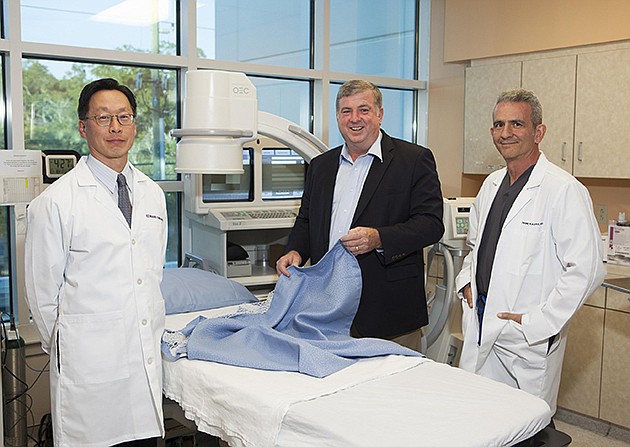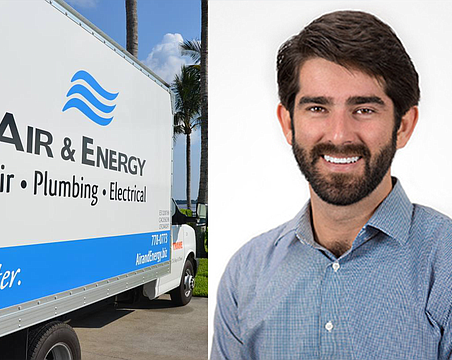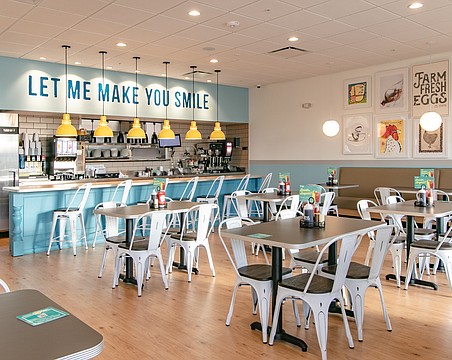After 23 years at St. Petersburg-based Valpak and Cox Target Media, Jim Sampey decided to retire in 2012.
But it didn't last long.
A neighbor who had been in the fabric business for 45 years reached out to Sampey in 2014 for some advice on a business plan he was working on. After looking at the business strategy, Sampey started to get excited — there was a lot of potential.
The company was focused on using a patented technology that when applied to fabric, leverages chlorine bleach to kill bacteria and viruses for up to 120 days. The company bought the worldwide rights to the patented technology from Milliken, a chemical company with more than 150 Ph.D.s on staff, according to Sampey.
At first, the business was focused on making scrubs with the technology. But Sampey was intrigued by the bigger picture: Killing bacteria on contact could be huge for more than just health care textiles. Think of industries like hospitality, where hotels, cruise lines and sporting agencies carry bacteria on soft surfaces every day.
Sampey was named CEO in the third quarter last year, and they officially launched the company, Largo-based Prime Medical, in June 2016. The company is privately held, with 12 employees. “We've been focused on hospitals, surgery centers, acute care, long-term care, anywhere where there's infection,” Sampey says. With regulatory requirements to track and record infections, “we have a regulatory wind in our sails,” he adds. Prime Medical has representatives in nine states who are distributing its products.
A lot of the team has come from outside the industry, Sampey says. “From my perspective, it's just business.” He's even brought over a few people from his team at Valpak.
At Valpak, with 30,000 to 40,000 customers a month, the company was focused on what the customer needs, and “we're focused on the same thing here,” he says. “It's nice to come from outside the industry and apply common sense.”
For example, his team explored what people don't like about hospital gowns — they expose your backside. So the company changed gowns to have snaps down the side. They also found that curtains in hospital rooms were rarely changed because they required a ladder to take down and wash. Prime Medical created curtains with snaps between the curtain and the ceiling that could easily be pulled down from the floor.
After traveling to Jordan, the company learned women doctors wanted more privacy and coverage than they got from standard scrubs. When they brought the new design back to the states, they found that a number of people in colder climates wanted the same thing. “We have an extra sensitive ear to what the customer is asking for,” Sampey says.
The company has developed an ambassador program that allows potential customers to try out the product if they provide feedback. They've also attended a number of conferences and trade shows to listen to pain points in the industry.
Coming from the outside can also be a challenge, Sampey admits. It was difficult, for example, to determine the hot spots within each organization, from the ER to the ICU to surgery centers.
But the company isn't trying to build a full distribution model. “We're not trying to compete against the big boys that have the distribution. We're going to try and partner with them,” Sampey says. Right now, there's not another fabric technology that uses chlorine bleach to kill bacteria and viruses, so the company is meeting with big companies to see if they want to add the product to their portfolio.
Other initiatives are in the works. The list includes getting into veterans' hospitals; a partnership with the Centers for Disease Control and Prevention to research bacteria and soft-surface technology; and potentially working with USAID about potential applications for tents and clothing in refuge camps.
A core challenge is to remain disciplined on the core mission. Focus can be a challenge when “bacteria is everywhere,” Sampey says. That's why the company is looking at opening an office in Dubai, because of the population concentration in places like Africa, India and Iraq. Says Sampey: “The bacteria numbers there are also two to four times higher than they are here.”






